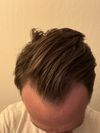community So we have 20k dollars human like machines available but no new effective treatment for hairloss since finasteride :)
There have been no new effective hair loss treatments since finasteride, despite technological advancements. Current treatments include finasteride, minoxidil, and RU58841, with ongoing challenges and potential future solutions in research.


